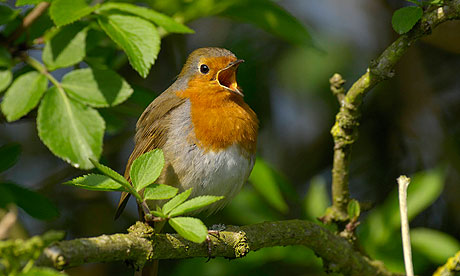Climate change causes birds to lay eggs early
Conservationists worry that common species of British birds could emerge before suitable food is available

Robins are one of Britain's popular birds hatching their eggs earlier because of climate change. Photograph: Sue Tranter/RSPB
Climate change is making British birds lay their eggs earlier in the year, according to a major survey of how common species are changing their behaviour to cope with warmer temperatures.
Analysis of 30,000 nests shows that birds such as the chaffinch and the robin are laying their eggs about a week earlier than in the 1960s. A similar pattern has been seen for other species, such as blue tits, great tits and swallows.
The survey also found that birds were altering their nesting and migration patterns, and travelling further to find food. The change in egg-laying behaviour has prompted concerns that young birds could emerge in spring before suitable food is available.
Matt Murphy, ornithologist for the Countryside Council for Wales said climate change was affecting the breeding patterns of pied flycatchers living in Welsh oak woodlands.
He said: "They appear to be breeding earlier across a number of sites and the worry is they may eventually breed so early they are out of sync with their major food source of caterpillars."
The annual State of the UK's Birds report was produced by several conservation groups, including the RSPB, Natural England and the Wildfowl and Wetlands Trust. It shows that drier summers are forcing species such as the song thrush to rear fewer chicks. The birds rely on earthworms for food, which are harder to find in drier ground.
Dr Mark Avery, conservation director for the RSPB, said: "This year's report shows that climate change is with us already and from our gardens to our seas, birds are having to respond rapidly to climate change simply to survive. As often before, birds are acting like the canaries in a mine shaft and giving us early warning of dangerous change."
The report found many of the UK's farmland and woodland birds species were continuing to decline, particularly specialists that require a particular habitat, such as the lesser-spotted woodpecker.
In Scotland, there has been a fall in the breeding success of seabirds such as guillemots, puffins and kittiwakes, as warming sea temperatures affect the food chain.
Conservationists are concerned the drop in productivity, as a result of a lack of sandeels, will mean fewer breeding birds and continued decline of key species.
The critically endangered Balearic shearwater, another seabird, has been spotted more often in the UK, as climate change forces it to travel further to find fish.
But the report said there have been large declines in numbers of over-wintering wading birds such as purple sandpipers, ringed plovers and dunlins, which come to the UK's estuaries from northerly and easterly breeding grounds.
It said the birds could be "short stopping" - remaining on the continent as the conditions there become more suitable in the winter.
The report said that a dramatic reduction in duck numbers spending the winter at Lough Neagh in Northern Ireland, suggested some key bodies of water in Europe were no longer freezing over.

No comments:
Post a Comment